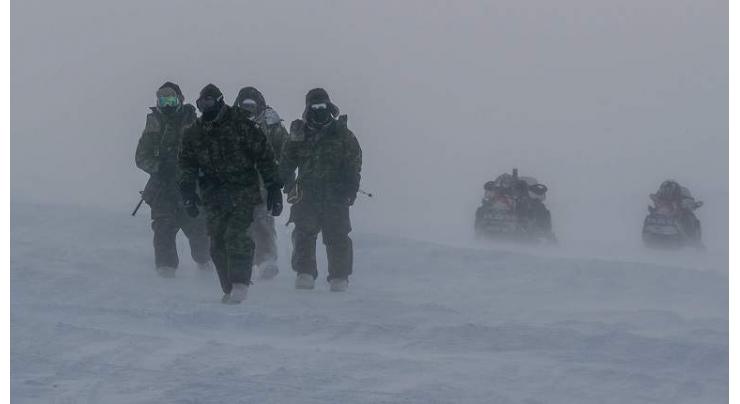
Large NATO Drill In Arctic Not Connected To US-Russia Talks In Geneva - Expert
Sumaira FH Published January 20, 2022 | 09:36 PM

Large NATO maneuvers in the Arctic planned for March are not directly linked to the current negotiations in Geneva between Russia and the United States, but do bolster Washington's position, Yannick Queau, the director of the Brussels-based think tank Group for Research and Information on Peace and Security (GRIP), told Sputnik on Thursday
BRUSSELS (UrduPoint News / Sputnik - 20th January, 2022) Large NATO maneuvers in the Arctic planned for March are not directly linked to the current negotiations in Geneva between Russia and the United States, but do bolster Washington's position, Yannick Queau, the director of the Brussels-based think tank Group for Research and Information on Peace and Security (GRIP), told Sputnik on Thursday.
Earlier in the day, the US Mission to NATO announced that the alliance plans to hold its largest exercise involving 35,000 troops from 28 countries inside the Arctic Circle in early March.
"We must not overestimate or overinterpret the organization of these large-scale maneuvers in the Arctic by linking them to current problems. There are maneuvers of different sizes regularly in the North Atlantic. These are prepared and announced well in advance and the current difficulties in Ukraine have nothing to do with the organization of these exercises," Queau said.
The expert went on to say that it is more a coincidence than anything else, adding that with regard to the Geneva discussions between the US and Russia about the security architecture of Europe and world disarmament, these exercises in the Arctic, with deployment of the armed forces of NATO partners, may serve the American position as a reminder that the alliance will not lower its guard.
"From a geopolitical point of view, the Arctic is proving more and more interesting, economically speaking: mineral resources in the seabed, a northern passage for ships, at least during the summer thanks to global warming; the region whets appetites, every country wants their say in the exploitation of the seabed; but the bordering states, large like Russia, Canada or the USA, and smaller like Norway and the other Scandinavian countries which have been members of the Arctic Council since the 1990s, are rivals for the management of the region," Queau explained.
According to the expert, both Moscow and Washington have historically stationed nuclear missiles in the Arctic zone, but from 1970 onwards, a desire for appeasement saw the US withdrawing their rockets from Canada's far north and the Russians pulling their missiles out from a similar latitude. The GRIP director stressed that the militarization of the Arctic could be avoided by the superpowers.
"Today, all neighboring countries have an interest in avoiding an arms race in the region and the idea is emerging of limiting the prospects for militarization of the Arctic. The diplomatic game is always preferable to a military opposition," Queau concluded.
In November, the Russian Foreign Ministry expressed concern over US military activity in the Arctic, while reiterating Moscow's desire to see the region as a space for beneficial cooperation. The ministry also noted that the Northern Sea Route is controlled by Russia in accordance with all international standards.
Related Topics
Recent Stories

Robinson, bowlers help New Zealand go 2-1 up against Pakistan

Shahzeb Chachar to hold khuli kachehri on April 26

Heatwave amid Israel's aggression in Gaza brings new misery, disease risk

Tourism must change, mayor says as Venice launches entry fee

Court adjourns Judicial Complex attack case till May 17

Nasreen Noori’s book ‘Popatan Jahra Khwab’ launched

Wafaqi Mohtasib inspection team visits Excise and taxation office

AJLAC announces 5th Conference titled ‘People’s Mandate: Safeguarding Civil ..

Pak-US officials engage to enhance trade, investment ties

IBCC to promote educational excellence, expand regional presence

Pakistani 'Blue Helmets' serving UN Peacekeeping Mission in DR Congo set to leav ..

Putin says plans to visit China in May
More Stories From World
-
Russian, Ukrainian strikes kill at least 10 in frontline regions
4 minutes ago -

Heatwave amid Israel's aggression in Gaza brings new misery, disease risk
17 minutes ago -

Tourism must change, mayor says as Venice launches entry fee
17 minutes ago -

Pakistani 'Blue Helmets' serving UN Peacekeeping Mission in DR Congo set to leave after 20 years of ..
59 minutes ago -

Putin says plans to visit China in May
59 minutes ago -

US reinstates open internet rules rescinded under Trump
59 minutes ago
-

Honda announces US$11 bn EV battery and vehicle plant in Canada
1 hour ago -

Portugal marks 50 years of democracy with far right on the rise
1 hour ago -

Oman, UAE deluge 'most likely' linked to climate change: scientists
2 hours ago -

BHP launches $38.8 billion takeover bid for rival Anglo American
2 hours ago -

Saudi oil giant Aramco agrees major FIFA sponsorship deal
2 hours ago -

Putin says plans to visit China in May
2 hours ago










